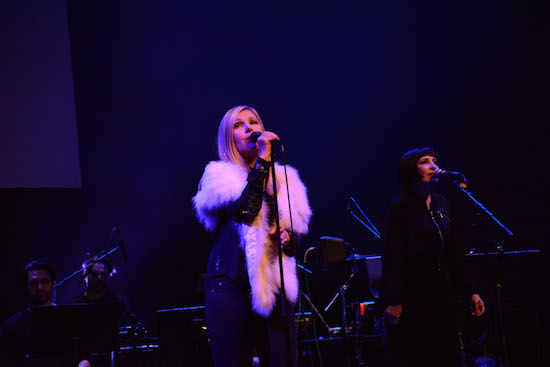Live photographs courtesy of Jamie Fry
Some of the greatest pop music to emerge from the UK had it roots in shared housing and cheap accommodation. Hear me out. With the dole once being a YTS-type hothouse of talent, rather than the spirit-crushing hell it is now, helping to incubate some of the best music. London was still very pre-gentrification in the early nineties. The houses were still more 1979 than 1990, with large immovable G-Plan units, a flammable dusky pink settee someone had possibly died on and a ban on using Blu-Tac. There would be a garden politely described as an unkempt mess one would only venture out into at gunpoint. The kitchen was where you’d end up dancing post-pub to your housemate’s latest Deep Heat collection, or doing homemade bongs to Going Blank Again among the landlord’s dated saucepans. It was a place and a feeling of being alive yet poor and getting a fourth day out of a sweatshirt.
This sort of morphed and formed into the main body of Britpop, albeit a pre-Britpop British Pop that had seen an intake of freaks and characters up to and including 1994. People like Pulp, then finally started getting somewhere with His & Hers, or the Manics staring into the abyss with The Holy Bible’s aggressive attack phase, Suede were going through almost daily dramas while concocting their Dog Man Star masterpiece, and Blur, who had seemingly embodied the spirit of the age with Parklife selling more in one week than their previous album had done at that point, now adapting to pop stardom. And then, naturally, came Oasis. A genuine shot in the arm after the thin gruel of Northern Uproar and the New Wave Of New Wave that had previously been the cover stars of the weeklies. It was as if the British Pop renaissance bugled by Select finally got going once Kurt Cobain shot himself, and almost overnight people became Lemonheads intolerant and abruptly ended dalliances with tawdry Nirvana simulacra in favour of Underworld, Orbital and Leftfield. All of these new stars looking to thwart M People and Wet Wet Wet and seize the imaginations of the open-minded with an assault of ideas, charity shop garments and great hair.
And in among all this were Saint Etienne.
After being a jukebox of ideas and references on their first two albums, Pete, Bob & Sarah had eventually settled into becoming a proper band, and Tiger Bay was to be a concept affair blending techno and orchestration with folk – a bunch of trad. arr. bangers if you will. Gone were the Billy Liar and French TV samples and now there was a focus on a collection of songs, although what should have been plain sailing after the Top Of The Pops moments of ‘You’re In A Bad Way’, but Tiger Bay was slightly beset by palaver, be it wrong choices of first single, distribution upgrades and the slightly annoying habit of having the album chopped, changed and refurnished with a new sleeve depending on the territory. They then almost went to the brink with touring and booze, managing to freak out and outdo Primal Scream (who called Sarah Cracknell ‘Shrapnel’) and a ‘cheery’ Pete Wiggs shouting “Mothra!” at the viewers when interviewed during the first televised Glastonbury.

This evening, assisted by the London Contemporary Orchestra, the band performed Tiger Bay in full. Having previously picked suitable venues and albums to celebrate in the past, such as Foxbase Alpha in Heaven or Good Humor at the British Library, performing Tiger Bay with a real orchestra gave the album the treatment it deserved. Evident from the opening ‘Urban Clearway’, here swooning like some Love Unlimited on a diet of R&S, with the detailed layers becoming apparent and fleshed out; likewise ‘Like A Motorway’ (named because it was ‘a bit Autobahn’) is magnificent this evening, ooomphed up and sounding like the No.1 single it should’ve been in the first place. A moving ‘Marble Lions’ is beautifully fragile and tear-inducing; and the gleeful percussionist’s time to shine that was the bouncy xylophoned joy of ‘Hug My Soul’. ‘On The Shore’ sounding transcendent gliding from a digital dub into windswept watercolours with singer Sewuese Smith stepping in for the Shara Nelson bits; the propulsive sturm und drang of ‘Cool Kids Of Death’ sounding almost a bit peak-Frankie and closing with a spookily, frozen hovering strings of ‘The Boy Scouts Of America’.
This wasn’t one of those hokey Hooked On Hacienda Classics efforts, this was giving Tiger Bay the sense of occasion and celebration it warranted, and by the time the band returned for a brace of the hits including guest turn Etienne Daho reprising his cameo on ‘He’s On The Phone’, it was feeling increasingly festive like you were surrounded by mates at your favourite club and the DJ knowing exactly what you require.
In an increasingly dark time, where we’re all feeling like everything’s reaching the end of its rainbow, where people, beliefs, moral compasses and relationships are disintegrating to an all-round general undoing of the universe as the backdrop, tonight (and indeed ‘Tonight’) felt optimistic and spring-like again, bulging with promise and expectation like it did all those years ago. A truly special evening from one of the most truly special groups we’ve ever been lucky to exist alongside.


